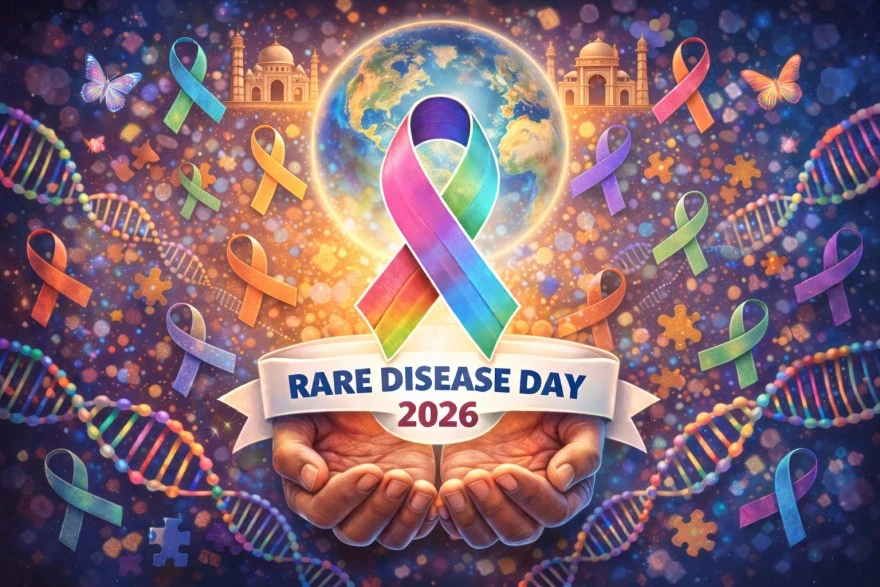Preventive Healthcare
Cluster Headaches: Causes, Symptoms & How to Manage Them

Table of Contents
- What are Cluster Headaches?
- Symptoms of Cluster Headaches
- Causes & Triggers of Cluster Headaches
- Diagnosis: How are Cluster Headaches Confirmed?
- Treatment Options
- Lifestyle & Home Remedies
- When to See a Doctor?
- Myths Vs Facts About Cluster Headaches
- Living with Cluster Headaches: Coping Strategies
- Conclusion
Living with cluster headaches can be exhausting, especially when the pain strikes suddenly and disrupts your daily routine. These attacks are intense, often affecting one side of the head, and can feel overwhelming both physically and emotionally.
But knowing what you're dealing with makes a huge difference. By understanding what causes them, how they show up, and the ways you can manage or reduce their impact, you'll feel more in control.
What are Cluster Headaches?
Cluster headaches are a rare but extremely painful type of headache that typically occurs in cyclical patterns or “clusters.” These episodes may last for weeks or even months, followed by periods of remission when the headaches stop completely.
Unlike migraines, cluster headaches are shorter in duration but much more severe in intensity. They often strike suddenly, usually affecting one side of the head, especially around the eye.
Types of Cluster Headaches
Cluster headaches fall into two main types. Knowing which type you have can help in planning a suitable cluster headache treatment and developing coping strategies.
- Episodic Cluster Headaches
This is the most common form. You may experience frequent headache attacks (once or multiple times a day) for weeks or months, followed by a headache-free period that can last months or even years.- The active period may last from 7 days up to a year.
- The pain-free remission period typically lasts at least a month.
- These headaches often occur at the same time each day, sometimes even waking you up from sleep.
- Chronic Cluster Headaches
This less common but more persistent type involves continuous headache periods with minimal or no remission.- Headaches occur almost daily for more than a year.
- Remission periods, if any, last less than a month.
- Because there's little to no break from the pain, this type can be more disabling and emotionally taxing.
- Important Notes:
- Both types involve extreme, sharp pain around the eye and temple on one side of the head.
- The timing and rhythm of these headaches are so consistent that some refer to them as “alarm clock headaches.”
- Recognising your pattern can help you prepare and seek timely relief or medical support.
Symptoms of Cluster Headaches
Cluster headaches strike quickly, usually without warning. Being familiar with the full range of symptoms can help you identify the condition early and seek proper care.
- Intense, Piercing Pain:
A sudden, sharp, or burning pain usually around or behind one eye. This is the hallmark cluster headache symptom and can be almost unbearable. - Short but Frequent Attacks:
Attacks can last from 15 minutes to 3 hours and may happen several times a day. - Same-Side Symptoms:
You’ll often notice redness, tearing, or swelling in one eye; a drooping eyelid; or a smaller pupil—all on the same side as the pain. - Restlessness:
During attacks, you may feel agitated or unable to stay still. - Other Common Signs:
- Runny or blocked nose on the side of pain
- Facial sweating
- Nausea or light sensitivity (though less common)
Causes & Triggers of Cluster Headaches
The exact cluster headache causes are still unknown, but research points to a few potential cluster headache reasons and common triggers.
- Hypothalamus Activity:
The hypothalamus, the part of your brain that controls biological rhythms, may play a role. This explains why cluster headaches often follow predictable schedules. - Family History:
If a close family member has them, your chances of developing them may be slightly higher. - Hormonal or Sleep Changes:
Disruptions in your natural sleep cycle can sometimes set off an attack. - Common Triggers Include:
- Alcohol – even small amounts can trigger a headache during a cluster period.
- Smoking – considered a major risk factor.
- Strong Smells – such as petrol, nail polish remover, or perfume.
- Overexertion – intense exercise can sometimes trigger an episode.
- High altitudes – like flying or mountain climbing.
Diagnosis: How are Cluster Headaches Confirmed?
There’s no single test for diagnosing cluster headaches, which can make the process a bit frustrating. But rest assured, with the right support, it can be done accurately.
- Medical History & Symptoms:
Your GP will start by asking detailed questions about your headache episodes—timing, duration, pain type, associated symptoms, and family history. - Examination:
A physical and neurological exam may be done to check for signs that help rule out other conditions like migraines, sinusitis, or even brain tumours. - Imaging Tests:
You may be referred for a brain scan (like an MRI or CT scan) to rule out serious structural issues. - Specialist Referral:
If your GP suspects cluster headaches, they’ll likely refer you to a neurologist for confirmation and management.
While the journey to diagnosis can be long, having clear, consistent records of your symptoms can speed up the process and lead to timely cluster headache treatment.
Treatment Options
While there's no definitive cure, several cluster headache treatment options can bring relief during attacks and help prevent future ones. Treatment often involves both acute relief and preventive strategies.
Acute Treatment – For Immediate Relief
These aim to stop or reduce pain once a headache begins.
- Triptans (Sumatriptan):
These fast-acting medications can be injected under the skin or used as a nasal spray. Injections tend to work faster than pills. - High-flow Oxygen Therapy:
Breathing pure oxygen through a mask for about 15 minutes can often stop an attack within minutes. It’s drug-free and safe for most people. - Neuromodulation Devices:
These small gadgets deliver mild electrical stimulation to nerves, reducing pain signals. Some target the neck (occipital nerve), while others stimulate the face or forehead.
Preventive Treatment – To Reduce Future Attacks
- Verapamil:
A calcium-channel blocker often prescribed to reduce the frequency and intensity of cluster headaches. - Lithium:
Usually used in treating mood disorders, lithium can help in chronic cases. - Corticosteroids (Prednisolone):
Short-term use may help break a cycle of cluster headaches quickly. - Nerve Blocks:
Local anaesthetic injected near the occipital nerve may help prevent attacks for weeks. - Surgery (Rare Cases):
Only used when other treatments fail. Involves implanting a device to block pain signals. - Lifestyle Considerations:
Preventing attacks is just as important as treating them. Avoiding alcohol, quitting smoking, and managing stress can all support long-term relief.
Speak to your GP or neurologist to tailor your cluster headache treatment plan. You’re not alone—effective help is available.
Lifestyle & Home Remedies
In addition to medical options, lifestyle changes can make a real difference in managing cluster headaches.
- Avoid Triggers:
Identifying personal triggers such as alcohol or strong smells is key. A headache diary helps track patterns. - Regular Sleep Routine:
Go to bed and wake up at the same time daily. Sleep disturbances are known to increase attacks. - Stay Hydrated:
Dehydration can be a trigger, especially during warmer months or when exercising. - Stop Smoking:
Tobacco is a well-known risk factor for cluster headaches. Quitting can reduce both frequency and severity. - Gentle Activities:
Practices like deep breathing, meditation, or light walking during pain-free periods can reduce stress and improve wellbeing. - Cool Compress:
Applying a cold pack on the painful side of your face might offer temporary relief.
Lifestyle changes can feel slow at first but staying consistent can significantly lower the burden of your headaches over time.
When to See a Doctor?
Knowing when to seek professional help can prevent complications and improve your quality of life.
- Frequent Headaches:
If you have repeated episodes of intense, one-sided pain, consult your GP—even if you're unsure they’re cluster headaches. - Over-the-Counter Painkillers Don’t Work:
If ibuprofen or paracetamol don’t help, you may need prescription options. - Symptoms Are Worsening:
Longer attacks, changes in pattern, or increased frequency are all red flags. - New Symptoms Appear:
If your vision changes, or if there’s weakness or numbness, seek urgent medical attention. - First-Time Symptoms:
If your eyelid droops or one pupil looks smaller, go to A&E—even if you've been diagnosed before.
Myths Vs Facts About Cluster Headaches
Let’s clear up some common misunderstandings about cluster headaches.
|
Myth |
Fact |
|
“They’re just bad migraines.” |
No, cluster headaches are a different condition entirely. |
|
“Only men get them.” |
While more common in men, women can experience them too. |
|
“They’re caused by stress.” |
Stress may trigger them, but it’s not the root cause. |
|
“There’s nothing you can do.” |
Many treatments and coping strategies are available. |
|
“They go away with age.” |
Not always—some people have them for life. |
Understanding the cluster headache meaning and facts helps you take better control of your health.
Living with Cluster Headaches: Coping Strategies
Managing cluster headaches isn’t just about treatment—it’s also about everyday coping.
- Build a Support System:
Share your diagnosis with loved ones so they understand and can help when attacks occur. - Headache Diary:
Track your symptoms, triggers, and response to treatments. This empowers both you and your healthcare provider. - Emergency Kit:
Keep oxygen supplies, medications, and your neurologist’s details handy during a cluster period. - Positive Mindset:
Try not to let fear of attacks limit your life. Use the pain-free phases to recharge, plan, and enjoy life.
You're stronger than your headaches. With knowledge, support, and proactive care, you can live well.
Conclusion
Cluster headaches can feel overwhelming, but knowing their causes, recognising the symptoms early, and following the right treatment plan can make them more manageable. No one should feel alone, and support is available every step of the way. If you're unsure about your symptoms or need accurate testing to rule out other health conditions, timely diagnosis is crucial.
In this regard, Metropolis Healthcare stands out with its advanced pathology services, expert neurological panels, and convenient home sample collection. For dependable diagnostics and patient-first care, consider choosing Metropolis for




























